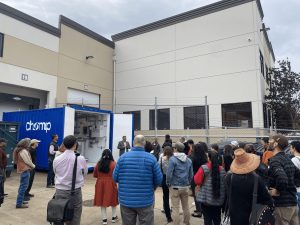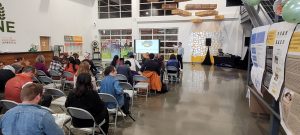By Allie Long
What if our garbage didn’t end up in the landfill, but instead could transform into something that was life-giving and helpful? Fortunately, for residents of Seattle’s South Park neighborhood, this idea has become a reality.
The Duwamish Valley Sustainability Association (DVSA), together with support from the South Park community, University of Washington’s EarthLab, the EPA, Food Lifeline, the City of Seattle, Seattle Parks Foundation, Sustainable Seattle, ECOnorthwest, NextCycle and 360 Social, has spent the last several years creating the first community-owned biodigester in Seattle.
On October 11th, 2024, the DVSA team celebrated the biodigestor’s opening week with colleagues and community members. After a brief introduction to the project, event participants were able to tour the biodigestor, permanently installed in a truck bay at Food Lifeline.
How it Works

A biodigester is a sealed tank system that works because the anaerobic bacteria inside of it breaks down our organic waste – like old banana peels, used coffee grounds, and the takeout in your fridge that’s definitely past its prime – because of the absence of oxygen. This process then creates valuable resources like biogas (which is a type of renewable energy) and digestate (which is a nutrient-rich probiotic plant food that can be used as a fertilizer); both of which communities can use to sustainably generate energy while simultaneously reducing greenhouse gas emissions. The result is a hyper-localized circular economy that transforms waste into a resource—by and for community.
Why it Matters
Imagine a future where neighborhoods own and manage their waste systems, using food scraps to support local food production, improve air quality, and provide renewable energy. The biodigester project is a small but significant step toward building that future, where communities have greater ownership over the resources they create.
The hope is that this project will not only reduce waste and generate clean energy but also build healthier relationships with what we consume and what we leave behind. “By converting food waste into a resource, we’re creating a cycle that keeps the benefits directly in the community: providing healthy food for local gardens, teaching youth about sustainable systems, and inspiring new ways of thinking about waste,” shared Edwin Hernandez.

Furthermore, South Park is one of the lowest ranking areas on the Health Equity Index in the state of Washington with a 10 out of 10 severity rating. This means that people living here face higher rates of pollution and greater health risks than other Seattle residents.
“If we give youth, especially in our Latino community, the tools and opportunities to discover new careers related to STEAM (science, technology, engineering, art, and mathematics), they could be the future professionals who replace those currently working at the EPA, King County, City of Seattle, and Boeing…and who also have knowledge of how to work harmoniously with their community and achieve results,” shared Hernandez in an interview with the UW Center for Environmental Health Equity.
This is why the biodigester is more than a piece of green technology—it’s a symbol of what’s possible when residents and partners come together to build solutions that work for everyone. By piloting this project in South Park, DVSA is laying the groundwork for a model that could be scaled up to other neighborhoods in Seattle and beyond.
This work is part of the Just Circular Communities Collaborative (JC3), an initiative that seeks to envision and implement localized, regenerative, and community-driven circular systems for a Just Transition – by, with, and for Frontline communities.
How You Can Support This Work

In order for this project to be efficient and economically viable, the team is currently in the process of raising money to purchase a truck and a utility trailer to transport food waste from across the South Park community to the biodigester. If you’d like to donate to this funding goal, visit the Seattle Parks Foundation website here.
South Park’s small but mighty biodigester will be able to process roughly 200+ lbs of organic waste per day, which will turn into around 79 million Btu of heat energy in gas per year and 180 gallons/week of probiotic plant food to boost local crops.
With so many gallons of probiotic plant food available, the DVSA team is also looking for additional local partnerships that would be interested in picking up fertilizer on a regular basis to keep the processing running smoothly. If you know any local farms that would be interested in partnering with DVSA in exchange for plant food, please email DVSA’s Project Manager Todd Schindler.